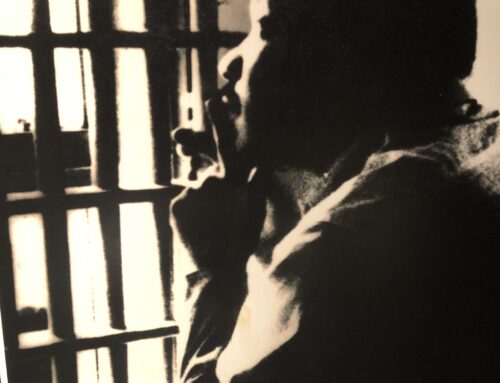Jerusalem was crowded with pilgrims celebrating Passover. The Roman governor, Pilate was trying to maintain order and still continue with business as usual. So Jesus was not the only one who was sentenced to be crucified on this particular Friday. There were at least two others. One was on Jesus’ left and the other on His right. After six grueling hours, Jesus died first which means that while casual observers passed by throughout the day, these two criminals heard every word Jesus had to say. Let’s listen in:
A Word of Forgiveness
Father, forgive them, because they do not know what they are doing. Luke 23:34
The soldiers who took Jesus’ life were just carrying out orders. They had no theological perspective. They were loyal to Pilate and did their job. So Jesus’ first words as the nails pierced His flesh were words that could only be fulfilled because the nails pierced His flesh. The wounds the soldiers made were wounds that could heal them. Jesus not only died for us, He died by us so that He could die for us. As the blood began to flow, forgiveness was Jesus’ first word because forgiveness is our first need.
A Word of Grace
Truly I tell you, today you will be with me in paradise. Luke 23:43
One of the criminals joined in the mocking with the soldiers, but the other humbly asked, in the last hours of life, for Jesus to remember him. We know nothing about this man except that he was being executed with Jesus, but that unlike Jesus, he was guilty as charged and knew it. Still, as he turned to Jesus, Jesus gave him the assurance of eternal life. Twenty minutes earlier anyone would have assumed that criminal was light years away from God, and perhaps he was, but grace quickly closed the gap. God’s grace still closes the gap just like that for everyone who turns to Jesus.
A Word of Compassion
Woman, here is your son. John 19:26
Can you imagine as Mary’s mind rushed back to the moment the angel announced she would give birth to a Son, as shepherds came to celebrate with them at Jesus’ birth, as Simeon blessed the Child and then said, “a sword will pierce your very soul” (Luke 2:35)? Now, from a bloody cross, Jesus said to His mother, “Here is your son.” We assume He was talking about the beloved disciple, John. We also assume he was letting her know John would take care of her, but we do not have to wonder if He loved His mother. As His hands and feet were pierced, her soul was pierced. More than anyone else present, Mary understood what was happening, but her theological insight did not stop her from feeling the pain of watching her son suffer and die. In the same way, Jesus’ devotion to saving the world did not distract Him from being near to His brokenhearted mother. The cross, in a way nothing else can, tells us God’s cares for us in the most personal way possible.
A Word of Rejection
My God, my God, why have you abandoned me? Mark 15:34
Some teachers of the Bible have wrongly assumed that here is where Jesus finally put aside His deity; that He ceased to be God. It is true that none of us can grasp the mystery or anguish of Jesus’ separation from the Father, but what we know is that only in Jesus’ divine nature is the Father’s abandonment of Him worthwhile. Paul clarified, “He made the one who did not know sin to be sin for us, so that in him we might become the righteousness of God” (2 Corinthians 5:21). Jesus does not remove our sin as a fellow sinner helping another sinner out of a difficult situation. Instead, Jesus endured the rejection of the Father by taking on our sin so that He could then cover us in His righteousness to present us to the Father. Jesus accepted what God hates in order to accept people whom God loves.
A Word of Satisfaction
I’m thirsty. John 19:28
Crucifixion was brutal. Whatever breaths Jesus took were likely with an open mouth. Air swept in and out, drying His throat. There were no words of complaint, no words of accusation, and no words of injustice. Blood was running from His skull as a crown of thorns were pressed upon His head and from His hands and feet as 9 inch nails were driven through to fix Him on wooden beams, but there were no words of pain either. The only word He spoke about His physical condition was His thirst. So He was given a sip of sour wine from a jar nearby. This was different from an earlier attempt to give Jesus wine mixed with myrrh, which was often used as an anesthetic. Jesus refused that as He willingly drank the cup of suffering. We could spiritualize Jesus’ thirst to suggest that He thirsted physically so we would not thirst spiritually. That is true, but what we know, what the beloved John, inspired by the Holy Spirit, wanted us to know for sure is that his friend, his Lord died thirsty, but He died well. When Jesus died for us, He died fully alive. He was awake, He was aware, and it was well with His soul.
A Word of Completion
It is finished. John 19:30
It all started, at least in earnest three years earlier as John the Baptist announced, “Behold, the Lamb of God who takes away the sin of the world” (John 1:29). Step by step, Jesus made His way to that rugged cross to do just that. His purpose was not political power. It was not financial prosperity. It was not military dominance. If any of that were His purpose, the cross would have been His defeat. The word is “tetelestai.” It’s from the root word “teleo,” which means to bring near or to fulfill or to complete. Like a telescope brings what is far away near, Jesus turned God’s eternal plan of redemption into a present reality. There is nothing more we can do to improve on what Jesus has done for us. He finished, and we can trust Him with that.
A Word of Confidence
Father, into your hands I entrust my spirit. Luke 23:46
This was not a closed-eyes, tight-fisted, wing-and-a-prayer leap of unfounded faith. This was total confidence that the Father who abandoned Him would not fail Him. Jesus was sure “weeping may spend the night, but there is joy in the morning” (Psalm 30:5). More specifically, Jesus quoted from Psalm 31 here, so He was also certain of God’s unfailing love (Psalm 31:21). The cross was not the end. Instead, it guaranteed that hope in Christ has no end.
Some people call these seven words, “Jesus’ Last Words,” as if they were words of despair, but we know that is not true. These words were not Jesus’ last and they were not words of despair. They were words of Good News–that His death was enough to give every lawbreaker new life.





